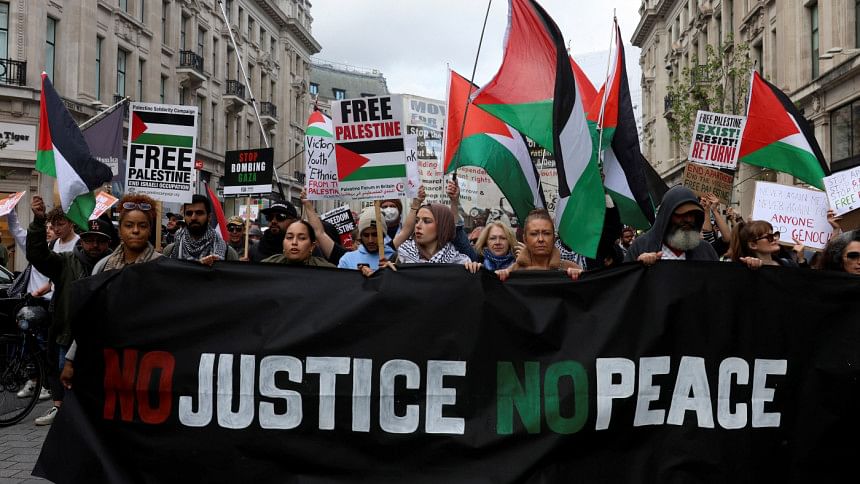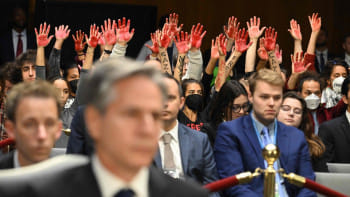The need for global unity for the Palestinian cause

In the wake of Israel's devastating attacks on Gaza, a powerful global movement has emerged reshaping the previously skewed narrative of the Israel-Palestine conflict. This movement, marked by international solidarity for Palestinian liberation, is not just a reaction to the current crisis but also a response, and a collective resistance to a long history of oppression of the Palestinians by the state of Israel. Since 1967, when Israel occupied the West Bank and Gaza, numerous grassroots organisations have formed, sowing the seeds for a broader global activism against occupation.
This year, social media platforms have played a pivotal role in this movement, challenging the bias in the Western countries and Western media. Young Palestinian journalists such as Motaz Azaiza, Plestia Alaqad, Hind Khoudary, to name a few, have been relentlessly documenting and exposing the cruel ground reality on social media. Hashtags such as #FreePalestine and #BoycottDivestSanction (BDS) have spread like wildfire, transforming the Palestinian struggle from a distant issue to a globally relatable cause.
The movement marks a wide reckoning with the history of the colonial regime that is behind the unabated genocide of Palestinians. People are looking back at history to see the systematic trend of oppression that underlines the foundation of today's glaring injustice. For example, the Gaza assaults in 2008-2009 and 2014, and the Sheikh Jarrah incident in 2021, have intensified global activism. The Sheikh Jarrah crisis involved the threatened eviction of Palestinian families in East Jerusalem by Israeli settlers, leading to legal disputes, protests, and international focus on issues of land rights and Palestinian residency. Tensions in Sheikh Jarrah also contributed to heightened violence in Jerusalem and the Gaza conflict in May 2021.
Personal stories have also come to the forefront of the solidarity movement over the years. Malak Mattar, a Gaza artist, depicted life during the 2014 attacks. Muhammad al-Durrah, a 12-year-old Palestinian killed in 2000, symbolised children's plight in conflict. Rachel Corrie, a US activist, was bulldozed to death in 2003 while protesting home demolitions. Their stories highlight decades of civilian suffering and the resilience of activism.
This time, Israel's indiscriminate bombings of Gaza's civilian infrastructure, resulting in over 15,000 deaths including more than 10,000 women and children and over 101 UN staff, as per Al Jazeera, has sparked global protests calling for an immediate ceasefire. This international community now sees no alternative to restoring Palestinian rights, addressing Gaza's humanitarian needs, and establishing a two-state solution.
In the UK, the Palestinian Solidarity Campaign (PSC) leads the way in advocating for Palestinian rights, while in the US, Jewish Voice for Peace (JVP) has been instrumental in keeping the Palestinian cause at the forefront of public discourse. Alongside them, organisations such as American Muslims for Palestine (AMP) and the European Coordination of Committees and Associations for Palestine (ECCP) have contributed significantly to maintaining momentum and visibility for the movement.
Jewish groups, such as JVP, have been active participants in the solidarity movement. Their engagement, notably in supporting initiatives like the Boycott, Divestment, Sanctions (BDS) Movement and opposing Israeli policies, highlights that criticism of Israel's actions is a matter of human rights advocacy rather than anti-Semitism. This coalition of diverse organisations, including IfNotNow and Friends of Al-Aqsa (FOA), underlines the inclusive nature of the movement, uniting various groups in a common goal of justice and human rights for Palestinians.
Activist Lucas Febraro, DiEM25's director of communications, challenges Germany's stance on the Israel-Palestine conflict. He condemns support for "unspeakable crimes" against Palestinians, rejects past atrocities justifying present injustice, and risks his career to oppose government violence. Febraro and activists like him redefine the debate, emphasising speaking out against oppression and advocating for humanist values, contributing to a global conversation on justice and equality.
However, the movement for Palestinian rights faces challenges from the pro-Israel lobby, which often accuses activists, especially those involved in the BDS Movement, of anti-Semitism. These accusations contribute to a contentious atmosphere, impeding advocacy efforts. John Mearsheimer, a distinguished University of Chicago professor of international relations, has critically addressed this dynamic. He highlights how claims of anti-Semitism are strategically employed to suppress discussions on Zionism in Western contexts, coining the term "the great silencer" to describe this phenomenon. Mearsheimer's insights reveal the complex ways in which these accusations influence and often hinder open discourse on the Israel-Palestine conflict.
Business tycoon Elon Musk's experience vividly illustrates the proactive strategies frequently deployed by pro-Israel lobbies. When Musk openly expressed sympathy for Palestinians, he found himself in a swath of accusations of anti-Semitism, subjected to escalating pressure from these groups. The culmination of this pressure coerced him into embarking on a high-profile visit to Israel's Gaza war front, where he appeared alongside Israeli Prime Minister Benjamin Netanyahu, semiotically endorsing Israel.
This situation not only spotlights the substantial influence wielded by pro-Israel lobbies, but also accentuates the intricate challenges that public figures face in navigating such politically charged environments. Musk's transformation from a sympathiser of Palestinian rights to a prominent advocate for Israeli perspectives reveals the profound sociopolitical dynamics in play. It illuminates how influential lobbying groups can shape and manipulate public discourse surrounding the Israel-Palestine conflict, exerting their impact even on globally renowned figures like Musk.
Recent protests in Tel Aviv against Netanyahu's government reflect further the growing internal dissent within Israel. Sparked by the government's handling of the Hamas attacks, these protests underscore the diverse and often conflicting opinions within Israeli society. In Tel Aviv, several thousand protesters, including relatives and friends of some of the captives, chanted, "Bring them home now." Take for example, Maoz Inon, the son of Bilha and Yakovi, who were murdered in the Hamas attacks. In protest Inon said, "Unless the Western governments stop supporting Netanyahu the war will never end. So I am crying to the world, don't support Netanyahu, don't send us weapons." These often unheard perspectives from inside Israel show the need for solidarity with humanity, and illuminates the blatant politics driving the current genocide.
Today's global solidarity movement transcends mere political activism; it embodies a deeply human response to a long-standing conflict. It represents a collective call for justice, equality, and human rights, transcending national and religious divides. As the movement continues to grow, it holds the promise of significantly influencing future diplomatic and policy discussions, advocating for a peaceful resolution. It is imperative that we keep up the momentum to call for a permanent ceasefire.
Mohammad Auwal is professor of communication studies at California State University, Los Angeles.
Views expressed in this article are the author's own.
Follow The Daily Star Opinion on Facebook for the latest opinions, commentaries and analyses by experts and professionals. To contribute your article or letter to The Daily Star Opinion, see our guidelines for submission.

 For all latest news, follow The Daily Star's Google News channel.
For all latest news, follow The Daily Star's Google News channel. 







Comments